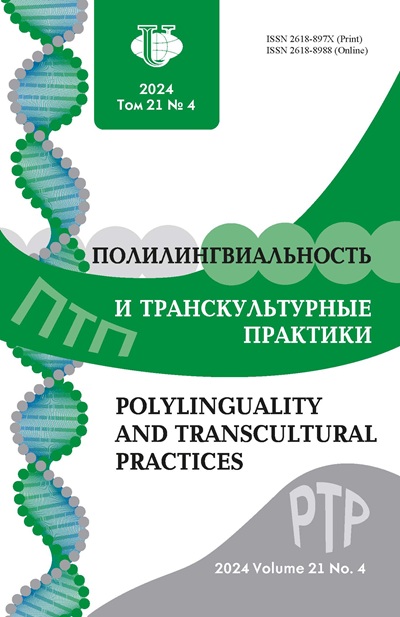No 3 (2010)
- Year: 2010
- Articles: 23
- URL: https://journals.rudn.ru/polylinguality/issue/view/180
Articles
Term Formatting: Romantic Imagination Categories
Abstract
Main stages of romantic imagination categories formatting before and within romanticism are considered in the article. E. Burke, S.T. Coleridge, W. Scott contributed to the categorical analysis and development of terms sublime, imagination, supernatural which were actively implemented into the romantic authors' creations.
Polylinguality and Transcultural Practices. 2010;(3):5-10
 5-10
5-10


 11-16
11-16


 17-21
17-21


Phonostylistic Analysis Of Oral Business Speech
Abstract
This article is devoted to an analysis of interaction of lexical, grammatical and intonation means of oral business speech. The phonostylistic analysis gives an opportunity to increase communication efficiency in occupational and business spheres.
Polylinguality and Transcultural Practices. 2010;(3):22-27
 22-27
22-27


 28-32
28-32


 33-36
33-36


Two cilisations, two cultures:an attempt of a dialoge(on example of novel by L. Hughes «Luany from jangles»)
Abstract
The article studies the short-story written by African American writer Langston Hughes from the cultures dialogue point of view. Hughes compares Europеan-north-american and African cultures on different levels revealing his own author's position on the problem.
Polylinguality and Transcultural Practices. 2010;(3):37-40
 37-40
37-40


 41-48
41-48


 49-53
49-53


Dynamic Of The Language In Russian Lexicography X-Age
Abstract
Particularities of the reflection are considered in article in explanatory dictionaries of the changes to lexical system of the russian language in XX ages. Emphases is spared different way of the fixing the dynamic of the language in the most important explanatory dictionaries of the russian language.
Polylinguality and Transcultural Practices. 2010;(3):54-58
 54-58
54-58


 59-63
59-63


Cognitive Peculiarities Of Philological Terminology From The Aspect Of Russian As A Foreign Language
Abstract
The article given is devoted to the problem of cognitive style of students of Philological Faculty. The author deals with abstract nouns that name actions and qualities and describes their distribution in linguistic and literary texts.
Polylinguality and Transcultural Practices. 2010;(3):64-69
 64-69
64-69


 70-74
70-74


Usage Of The Simultaneous-Diachronic Approach To Help Develop Communicative Competencies Of Foreign Language Speakers (The Case Study Of Verbal Form)
Abstract
The article describes the use of the comparative simultaneous-diachronic approach in the study of verbal form which allows foreign language speakers to understand the logic of juxtaposition, word and form choice, and thus supports their ability to develop communicative competencies in Russian language.
Polylinguality and Transcultural Practices. 2010;(3):75-81
 75-81
75-81


Linguistic And Conceptual Pictures Of The World: Communicative Aspect
Abstract
In the article the specificity of interaction of society of different types and information value of the concept are analyzed. Especially attention is paid to the rise of the communicative failure on the ground of multiple-valued interpretation of the concept.
Polylinguality and Transcultural Practices. 2010;(3):82-86
 82-86
82-86


Using The Principle Of Bilingualism In Teaching Process For ForeignStudents
Abstract
Basic aspects of the bilingual teaching physics at the medical and biological department of Russian State Medical University: purposes and missions, the content and the method with using of english-russian bilingual study-guides on physics developed by the author. Results of the validity of the bilingual teaching physics as a means of the information-communicative competence of foreign students have been presented.
Polylinguality and Transcultural Practices. 2010;(3):87-92
 87-92
87-92


Linguacountry Study Of The «Reverse Vector» As One Of The Most Important Aspects Of Teaching Foreign Students Russian
Abstract
The article is concerned with the essence of linguacountry study component, its role and place in teaching foreign languages. The article describes how the «reverse vector» works in the process of teaching foreign students Russian.
Polylinguality and Transcultural Practices. 2010;(3):93-96
 93-96
93-96


Studying Of Russian Language As New View On The World
Abstract
Knowing representatives of other people and cultures, the person usually perceives their behaviour from positions of it's own culture because it's hard to know at once other culture's features, sometimes even the mimicry, gesture, other elements of behaviour can lead to negative perception. In such cases a real way out is the knowledge of stereotypes - the most typical lines, characteristic for these or those people, this or that environment.
Polylinguality and Transcultural Practices. 2010;(3):97-103
 97-103
97-103


Development Of Language Skills In Medical Profession While Preparing Foreign Students For Clinical Practice
Abstract
The article presents a model of intensive training the professional speech skills necessary for the course of «Internal Diseases». The article presents a system of exercises to develop medical language skills necessary for a doctor-patient communication concerning any pathology.
Polylinguality and Transcultural Practices. 2010;(3):104-108
 104-108
104-108


Intensification Of Teaching Russian To Swahili Speakers
Abstract
The article provides a contrastive analysis of Russian and Swahili, some phonetic and grammar similarities and differences between two languages are defined. The language phenomena are interpreted in such a way, which provides the efficiency of transfer of training while teaching Russian to Swahili-speaking students.
Polylinguality and Transcultural Practices. 2010;(3):109-113
 109-113
109-113


Рhonetic Tests In The Differentiating Model Of Teaching Pronunciation
Abstract
A differentiating model of teaching Russian pronunciation with the use of computer technologies is designed for foreigners learning the Russian language. The differentiating model of teaching presupposes a close control system: the process of teaching begins with the phonetic abilities test. It helps to choose an effective way of teaching. The results of progress and final testing help to change the training process substantially.
Polylinguality and Transcultural Practices. 2010;(3):114-119
 114-119
114-119


Creativity As Language Activity In The Process Of Education
Abstract
This article is dedicated to the study of human being's creative potential, which reflects capabilities of individual personality.
The development of future specialist' creativity, who had received higher education, is examined as very important factor of educative process.
The article touches some problems of professors of Russian language regarding forming language activity on the base creative process.
Polylinguality and Transcultural Practices. 2010;(3):120-125
 120-125
120-125


Our authors
Polylinguality and Transcultural Practices. 2010;(3):126-128
 126-128
126-128















